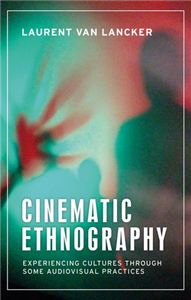Cinematic Ethnography
Experiencing cultures through some audiovisual practices
by Laurent Van Lancker
Description
More Information
Rights Information
Albania, Algeria, Angola, Argentina, Armenia, Australia, Austria, Bahrain, Belgium, Belize, Benin, Bolivia, Bosnia and Herzegovina, Botswana, Brazil, Bulgaria, Burkina Faso, Burundi, Cameroon, Canada, Cape Verde, Central African Republic, Chad, Chile, China, Colombia, Comoros, Congo [DRC], Congo, Republic of the, Costa Rica, Ivory Coast, Croatia, Czech Republic, Denmark, Djibouti, Ecuador, Egypt, El Salvador, Equatorial Guinea, Eritrea, Estonia, Ethiopia, Faroe Islands, Finland, France, French Guiana, Gabon, Gambia, Georgia, Germany, Ghana, Greece, Guatemala, Guinea, Guinea-Bissau, Guyana, Honduras, Hongkong, Hungary, Iceland, India, Indonesia, Iran, Iraq, Ireland, Israel, Italy, Japan, Jordan, Kazakhstan, Kenya, Kuwait, Latvia, Lebanon, Lesotho, Liberia, Libya, Lithuania, Luxembourg, Macau, China, Macedonia [FYROM], Madagascar, Malawi, Malaysia, Mali, Malta, Mauritania, Mauritius, Mayotte, Mexico, Mongolia, Montenegro, Morocco, Mozambique, Namibia, Netherlands, New Zealand, Nicaragua, Niger, Nigeria, Norway, Oman, Pakistan, Panama, Paraguay, Peru, Philippines, Poland, Portugal, Puerto Rico, Qatar, Reunion, Romania, Russia, Rwanda, Saint Helena, Sao Tome and Principe, Saudi Arabia, Senegal, Serbia, Seychelles, Sierra Leone, Singapore, Slovakia, Slovenia, Somalia, South Africa, South Korea, Spain, Sri Lanka, Sudan, Suriname, Swaziland, Sweden, Switzerland, Syria, Taiwan, Tanzania, Thailand, Timor-Leste, Togo, Tokelau, Tunisia, Turkey, Uganda, Ukraine, United Arab Emirates, United Kingdom, United States, Uruguay, Venezuela, Vietnam, Western Sahara, Yemen, Zambia, Zimbabwe, South Sudan, Cyprus, Palestine, Bangladesh, Cambodia, Liechtenstein, Azerbaijan, Jamaica, Kyrgyzstan, Dominican Republic, Myanmar, Monaco
Endorsements
Cinematic ethnography proposes an interdisciplinary approach to theories and practices at the intersection of art, anthropology and cinema. The book proposes a model of collective aesthetics and collaborative filmmaking, going beyond the straightforward representation of reality that is so prevalent in visual anthropology and film studies. This book explores the practices of filmmakers who utilise sensory collaborative approaches to convey diversity of knowledge. It affirms that the more we allow cinema to infuse audio-visual transmissions of reality, the more we might be able to experience the evoked reality. The book proposes a dialogic journey, inviting the reader to pause during the reading of the book to watch some of the author's films, which exemplify the discussed theories and practices. This innovative work from a practising filmmaker and visual anthropologist invites us to rethink how our cinematic practices, rather than aiming at factual representation and description, might instead contribute to a collaborative understanding of intercultural dialogue and shared knowledge. For those interested in visual anthropology, documentary film or broader questions about the nature of art and representation, Cinematic ethnography is a thought-provoking invitation to see - and tell - things differently.
Reviews
Cinematic ethnography proposes an interdisciplinary approach to theories and practices at the intersection of art, anthropology and cinema. The book proposes a model of collective aesthetics and collaborative filmmaking, going beyond the straightforward representation of reality that is so prevalent in visual anthropology and film studies. This book explores the practices of filmmakers who utilise sensory collaborative approaches to convey diversity of knowledge. It affirms that the more we allow cinema to infuse audio-visual transmissions of reality, the more we might be able to experience the evoked reality. The book proposes a dialogic journey, inviting the reader to pause during the reading of the book to watch some of the author's films, which exemplify the discussed theories and practices. This innovative work from a practising filmmaker and visual anthropologist invites us to rethink how our cinematic practices, rather than aiming at factual representation and description, might instead contribute to a collaborative understanding of intercultural dialogue and shared knowledge. For those interested in visual anthropology, documentary film or broader questions about the nature of art and representation, Cinematic ethnography is a thought-provoking invitation to see - and tell - things differently.
Author Biography
Laurent Van Lancker is Professor in Audiovisual Anthropology at the Aix-Marseille University.
Manchester University Press
Manchester University Press is a leading UK publisher known for excellent research in the humanities and social sciences.
View all titlesBibliographic Information
- Publisher Manchester University Press
- Publication Date January 2025
- Orginal LanguageEnglish
- ISBN/Identifier 9781526175236 / 1526175231
- Publication Country or regionUnited Kingdom
- FormatPrint PDF
- Pages280
- ReadershipGeneral/trade; College/higher education; Professional and scholarly
- Publish StatusPublished
- Dimensions216 X 138 mm
- Biblio NotesDerived from Proprietary 5126
- SeriesAnthropology, Creative Practice and Ethnography
- Reference Code12804
Manchester University Press has chosen to review this offer before it proceeds.
You will receive an email update that will bring you back to complete the process.
You can also check the status in the My Offers area

Please wait while the payment is being prepared.
Do not close this window.



